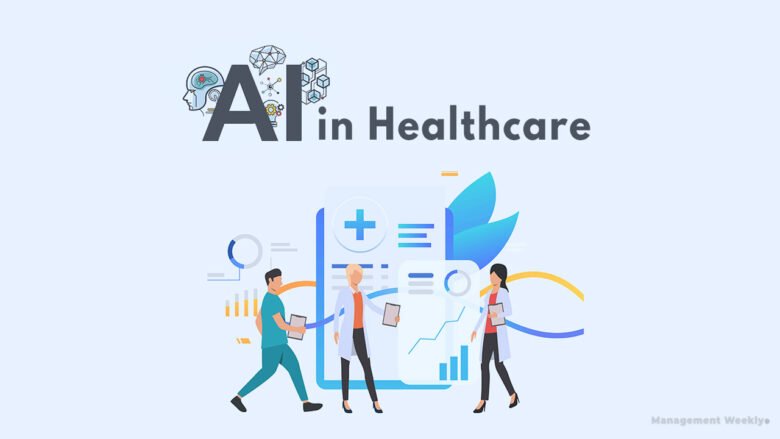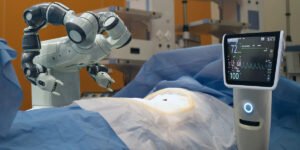Artificial intelligence (AI) is becoming a major force in the rapidly changing healthcare landscape. It has the potential to revolutionise the way we diagnose, treat and manage medical conditions. This article takes an in-depth look at all the different ways artificial intelligence is being used in healthcare and looks at how it can improve patient outcomes, make processes more efficient, and change the future of medicine.
The Development of Artificial Intelligence in Healthcare:
1. Diagnostic Accuracy
Artificial intelligence is very good at looking at very large sets of data quickly and accurately, making it a useful tool for troubleshooting. Medical images, such as X-rays and MRIs, can be processed with great accuracy using machine learning algorithms. This helps doctors detect and correctly diagnose diseases such as tumours and heart problems early and correctly.
2. Customised Treatment Plan
One of the most important parts of modern healthcare is tailoring treatment to each patient. Artificial intelligence is an important part of achieving this goal. Artificial intelligence algorithms can look at genetic information, patient history and treatment outcomes to recommend personalised treatment plans that are most effective and have the least negative impact.
3. How Predictive Analytics can Help Preventive Care?
AI-powered predictive analytics allows healthcare professionals to detect and prevent health problems before they occur. Artificial intelligence can find people who may have certain diseases by looking at patient data, life factors and genetic predispositions. This allows doctors to take preventive measures and develop a personalised plan for each individual.
Application of Artificial Intelligence in Various Areas of Healthcare:
1. Imaging and Radiology
Artificial intelligence has changed radiology forever. Algorithms can quickly review medical images to detect problems, speeding up the diagnostic process and making it more accurate. This not only ensures better patient care, it also makes the radiologist’s job easier.
2. Finding and Producing New Medicines
The process of creating new medicines is often lengthy and expensive. Artificial intelligence speeds up this process by looking at large amounts of data to find possible drug options, guessing how effective they will be, and making the clinical trial process easier. This could speed up the process of getting new treatments to people.
3. Monitor Patients Remotely
With the rise of smart technology and the Internet of Things, artificial intelligence has made it easier to pay attention to patients remotely. Continuous data collection and analysis allows physicians to pay immediate attention to a patient’s vital signs, medication use, and overall health. This allows them to identify problems early and provide each patient with a personalised care plan.
4. Talking Robots and Virtual Health Assistants
Chatbots and virtual assistants, powered by artificial intelligence, make patients more interested and provide them with useful assistance. They can answer questions, make appointments and even help with psychological problems. This makes healthcare more patient-oriented and accessible.
Questions to Think about and Ethical Points:
1. Data Security and Privacy
Artificial intelligence systems use large amounts of data, raising concerns about patient privacy and data security. Protecting private health information is important and requires strong security measures and ethical rules.
2. Deviation from Algorithm and Fairness
Artificial intelligence programmes are only as honest as the data they use. Ensuring that algorithms are fair and reduce bias is always a challenge, especially when it comes to factors like race and socioeconomic class that can inadvertently influence healthcare outcomes.
3. Regulatory Framework
Artificial intelligence is growing rapidly in healthcare, faster than the rules governing it. To ensure that AI technologies are used in medical practise in a safe and ethical manner, clear rules and guidelines are needed.
What will Artificial Intelligence Look Like in Healthcare in the Future?
1. Working Together to Increase Intelligence
The future of artificial intelligence in healthcare is not to replace doctors and nurses, but to allow them to do better work. Collaborative model initiatives where artificial intelligence works together with human physicians will increase efficiency and improve patient care outcomes.
2. The Diagnosis Continues to Improve
As AI systems become smarter, their diagnostic capabilities will continue to improve. Artificial intelligence has the potential to transform medical diagnosis through the early detection of cancer and the discovery of rare genetic diseases.
3. Enable Patient-Centered Care
More and more artificial intelligence tools will emerge to give people more control over their healthcare. With virtual health assistants and personalised health apps, patients have more ways than ever to get information and help.
4. Access to Healthcare around the World
Artificial intelligence can help fill the gaps in healthcare, especially in areas where there are not enough providers. Telemedicine, AI diagnostics, and remote tracking can help people without easy access to medical services get the care they need.
Case Studies on the Use of Artificial Intelligence:
1. What is IBM Watson Oncology?
IBM Watson for Oncology is an artificial intelligence-powered tool that looks at medical literature, clinical trial data and patient information to provide oncologists with cancer treatment recommendations. This allows doctors and nurses to stay abreast of the latest research and develop personalised cancer treatment plans.
2. Google’s DeepMind in Healthcare
Google’s DeepMind is already being used in healthcare, for example, to look at medical images and guess when a patient is deteriorating. The technology shows how artificial intelligence can be used to perform difficult medical tasks and improve patients’ lives.
3. PathAI for Pathology
PathAI uses machine learning to help pathologists diagnose diseases using pathology slides. When humans and artificial intelligence work together, diagnosis will become more accurate, especially in difficult areas of pathology.
Conclusion:
Artificial intelligence is not only a new technology, but also a huge change in the way healthcare is delivered. Artificial intelligence has the potential to transform the way healthcare is delivered around the world, making access to care easier and improving diagnosis and personalized treatment plans. But getting the most out of artificial intelligence in healthcare requires a careful balance between new ideas, ethical concerns and patient-centricity. As we live through this very different era, the key to fully realizing the benefits of AI in healthcare is combining human knowledge with AI skills.
FAQs:
1. How can artificial intelligence improve diagnostic accuracy in healthcare?
Artificial intelligence excels at analysing large data sets, including medical images and patient records, to provide fast and accurate diagnostic insights. This helps healthcare professionals achieve early detection and accurate diagnosis, ultimately improving patient outcomes.
2. Can artificial intelligence contribute to drug discovery and development?
Absolute. Artificial intelligence accelerates drug development by analysing extensive data sets to identify potential drug candidates, predict efficacy, and streamline clinical trials. This promises to more effectively deliver new treatments to patients.
3. What challenges does artificial intelligence face in healthcare, especially when it comes to patient data?
Artificial intelligence in healthcare faces challenges in data privacy and security. Protecting patient information is a top priority and requires strong cybersecurity measures and ethical principles to ensure the responsible use of sensitive health information.
4. How can artificial intelligence address biases in healthcare algorithms?
Reducing bias is an ongoing challenge. Ensuring the fairness of AI algorithms requires careful assessment of the data on which they are trained and steps taken to reduce bias. Ethical considerations and continuous monitoring are crucial.
5. What is the future of artificial intelligence in healthcare? What impact will this have on patient care?
The future of AI in healthcare includes collaborative models in which AI works with human physicians, expanding their capabilities. From advanced diagnostics to personalised patient care, artificial intelligence has the potential to redefine healthcare by improving efficiency and patient outcomes.



